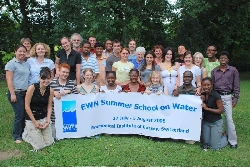
Contact: World Council of Churches, Feature by Annegret Kapp, + 41 22 791 6153, +41 79 507 6363, media@wcc-coe.org
WÜRTTEMBERG,
Photo: From 27 July to 5 August 2008, 22 young Christians from 18 countries and 6 continents met at the Ecumenical Institute in
While water is vital for all, Tourma and others attending this unique summer school know all too well that access to water, and the awareness of how precious it is, could hardly be more unequally distributed. As Christians, the 22 young men and women who met at the World Council of Churches (WCC) Ecumenical Institute in Bossey for eight days of intense learning about water issues feel compelled to speak out against this injustice.
Their professional backgrounds were as diverse as the 18 countries and six different continents they came from. Their presentations on water issues in their countries really complemented the lectures by international experts on water management, advocacy and development.
Summer school student Roderick Chukwuemeka Oji from
However, the content of these packets is far from safe to drink, the law student and Presbyterian youth leader explained. All too often the water that is sealed in this transparent plastic comes from an uncontrolled source and bears a made-up license number. No wonder the elites prefer bottled water from abroad, he said.
Oji was not the only one who reported on poor drinking water supplies in a country blessed with rivers and abundant rain. Participants from
Another student, Packiaraj Asirvatham from
While the campaign was successful at the time, the 27-year-old pastor of the
Lead role for youth
Youth have an important role to play in the preservation of water according to Oji. The more established leaders, even within the church, often do not address these issues.
Lilit Babajanyan from
When the concern for creation brings together Christians aged 20 to 30, they will of course not limit themselves to academic exercises. In between sessions they shared about their homes and cultures and taught each other songs from their home churches.
The drawings and hip-hop lyrics posted on the Ecumenical Water Network's summer blog also bear witness to their creative talents.
Creativity was one of the criteria for choosing candidates for the summer school because of its value in bringing to life powerful biblical stories about Christ's promise of justice and the "living water" of faith.
"How can Americans hold water as sacred when it is wasted away every day?" Kelly Forbush, a theology student from the United Church of Christ in the
One possible answer to Forbush's question came through the water-themed worship service which the summer school participants prepared for the Lutheran congregation of
The first generation of summer school "alumni", whether they came from the privileged regions of North America and Europe, where a constant supply of clean water is taken for granted, or whether they are faced with its scarcity in their every day lives, will not forget the need for water is shared by all.
And they will not keep to themselves the realization that consumer patterns in their own communities - concerning energy, meat, traffic and many other things - affect the water supply of people living on the other side of the globe.
As they travelled back to their home countries in early August, some already had concrete ideas about how to spread what they have learned, for example performing plays about the water crisis in public places or beverage stores. Others think about organizing regional summer schools. For knowledge, just like faith, multiplies when it is shared.
Annegret Kapp, WCC web editor, is a member of the Evangelical Church in Württemberg,
More information about the Ecumenical Water Network:
Photo gallery:
Video clips from the EWN summer school:
Listen to comments by participants of the EWN summer school (mp3 format, 3.9 MB):
oikoumene.org/fileadmin/files/wcc-main/sounds/2008/ewnschool08.mp3




 Sign Up to Receive Press Releases:
Sign Up to Receive Press Releases: